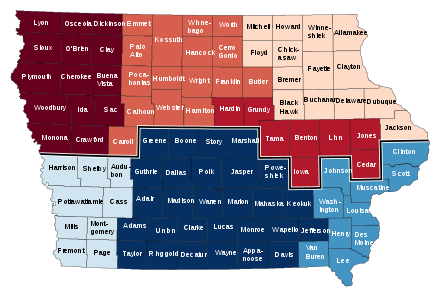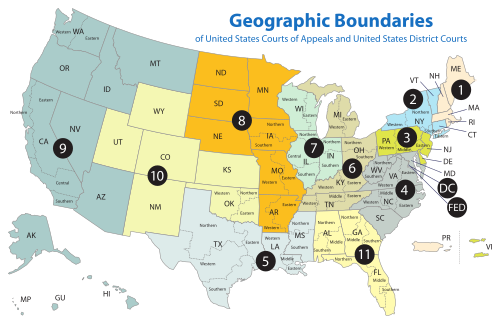United States District Court For The Northern District Of Iowa
The United States District Court for the District of Iowa, established on March 3, 1845, by 5 Stat. 789, was subdivided into the current Northern and Southern Districts on July 20, 1882, by 22 Stat. 172.
Presently, the court has two district judges, Chief Judge Leonard T. Strand and Judge C. J. Williams, one senior judge, Linda R. Reade, and two magistrate judges, Kelly Mahoney and Mark A. Roberts.
The court is headquartered in Cedar Rapids, with a satellite courthouse in Sioux City.
As of February 1, 2022, the acting United States attorney is Timothy T. Duax.
Jurisdiction

The Northern District of Iowa has four court divisions, each covering the following counties:
The Cedar Rapids Division, covering Benton, Cedar, Grundy, Hardin, Iowa, Jones, Linn, and Tama counties.
The Central Division, covering Butler, Calhoun, Carroll, Cerro Gordo, Emmet, Franklin, Hamilton, Hancock, Humboldt, Kossuth, Palo Alto, Pocahontas, Webster, Winnebago, Worth, and Wright counties.
The Eastern Division, covering Allamakee, Black Hawk, Bremer, Buchanan, Chickasaw, Clayton, Delaware, Dubuque, Fayette, Floyd, Howard, Jackson, Mitchell, and Winneshiek counties.
The Western Division, covering Buena Vista, Cherokee, Clay, Crawford, Dickinson, Ida, Lyon, Monona, O'Brien, Osceola, Plymouth, Sac, Sioux, and Woodbury counties.
Current judges
As of February 12, 2024:
| # | Title | Judge | Duty station | Born | Term of service | Appointed by | ||
|---|---|---|---|---|---|---|---|---|
| Active | Chief | Senior | ||||||
| 13 | Chief Judge | C. J. Williams | Cedar Rapids | 1963 | 2018–present | 2024–present | — | Trump |
| 12 | District Judge | Leonard T. Strand | Sioux City | 1965 | 2016–present | 2017–2024 | — | Obama |
| 11 | Senior Judge | Linda R. Reade | Cedar Rapids | 1948 | 2002–2017 | 2007–2017 | 2017–present | G.W. Bush |
Former judges
| # | Judge | State | Born–died | Active service | Chief Judge | Senior status | Appointed by | Reason for termination |
|---|---|---|---|---|---|---|---|---|
| 1 | Oliver Perry Shiras | IA | 1833–1916 | 1882–1903 | — | — | Arthur | retirement |
| 2 | Henry Thomas Reed | IA | 1846–1924 | 1904–1921 | — | 1921–1924 | T. Roosevelt | death |
| 3 | George Cromwell Scott | IA | 1864–1948 | 1922–1943 | — | 1943–1948 | Harding | death |
| 4 | Henry Norman Graven | IA | 1893–1970 | 1944–1961 | 1961 | 1961–1970 | F. Roosevelt | death |
| 5 | Edward Joseph McManus | IA | 1920–2017 | 1962–1985 | 1962–1985 | 1985–2017 | Kennedy | death |
| 6 | William Cook Hanson | IA | 1909–1995 | 1962–1977 | — | 1977–1995 | Kennedy | death |
| 7 | Donald E. O'Brien | IA | 1923–2015 | 1978–1992 | 1985–1992 | 1992–2015 | Carter | death |
| 8 | David R. Hansen | IA | 1938–present | 1986–1991 | — | — | Reagan | elevation to 8th Cir. |
| 9 | Michael Joseph Melloy | IA | 1948–present | 1992–2002 | 1992–1999 | — | G.H.W. Bush | elevation to 8th Cir. |
| 10 | Mark W. Bennett | IA | 1950–present | 1994–2015 | 1999–2006 | 2015–2019 | Clinton | retirement |
Chief judges
Chief judges have administrative responsibilities with respect to their district court. Unlike the Supreme Court, where one justice is specifically nominated to be chief, the office of chief judge rotates among the district court judges. To be chief, a judge must have been in active service on the court for at least one year, be under the age of 65, and have not previously served as chief judge.
A vacancy is filled by the judge highest in seniority among the group of qualified judges. The chief judge serves for a term of seven years, or until age 70, whichever occurs first. The age restrictions are waived if no members of the court would otherwise be qualified for the position.
When the office was created in 1948, the chief judge was the longest-serving judge who had not elected to retire, on what has since 1958 been known as senior status, or declined to serve as chief judge. After August 6, 1959, judges could not become or remain chief after turning 70 years old. The current rules have been in operation since October 1, 1982.
Succession of seats
|
|
| ||||||||||||||||||||||||||||||||||||||||||||||
U.S. Attorneys
- Maurice D. O'Connell 1883-86
- Timothy P. Murphy 1886-90
- Maurice D. O'Connell 1890-94
- Cato Sells 1894-98
- Horace G. McMillan 1898-1907
- Frederick F. Faville 1907-13
- Anthony Van Wagenen 1913-14
- Frank A. O'Connor 1914-21
- Guy P. Linville 1921-27
- Bennett E. Rhinehart 1927-31
- Harry M. Reed 1931-34
- Edward G. Dunn 1934-40
- Tobias E. Diamond 1940-52
- Michael L. Mason 1952-53
- F. G. Van Alstine 1953-61
- Donald E. O'Brien 1961-67
- Steve Turner 1967
- Asher E. Schroeder 1967-69
- Evan L. Hultman 1969-77
- James H. Reynolds 1977-82
- Evan L. Hultman 1982-86
- Robert L. Teig 1986
- Charles W. Larson, Sr. 1986-93
- Robert L. Teig 1993
- Stephen J. Rapp 1993-2001
- Charles W. Larson, Sr. 2001-2006
- Judith A. Whetstine 2007
- Matt M. Dummermuth 2007-2009
- Stephanie M. Rose 2009-2012
- Sean R. Berry 2012-2014
- Kevin W. Techau 2014-2017
- Peter Deegan 2017-2021
- Sean R. Berry 2021-2022
- Timothy T. Duax 2022-present
See also
- Courts of Iowa
- List of current United States district judges
- List of United States federal courthouses in Iowa
References
- ^ Asbury Dickens, A Synoptical Index to the Laws and Treaties of the United States of America (1852), p. 394.
- ^ U.S. District Courts of Iowa, Legislative history, Federal Judicial Center.
- ^ "Meet the U.S. Attorney". www.justice.gov. February 1, 2022. Retrieved February 1, 2022.
- ^ "U.S. Attorney Nomination Clouded". Washington Post. 2023-12-24. ISSN 0190-8286. Retrieved 2024-04-13.
- ^ Lisa (2022-11-22). "Death of Charles Larson, Sr". National Association of Former United States Attorneys. Retrieved 2024-04-13.
- ^ "Charles W. Larson Sr. — Department of Justice". Congress.gov. Retrieved April 12, 2024.
- ^ "Office of Public Affairs | Department of Justice Announces Matt Dummermuth to Head the Office of Justice Programs | United States Department of Justice". www.justice.gov. 2018-10-05. Retrieved 2024-04-13.
- ^ "USDOJ: Executive Office for United States Attorneys". 2014-01-13. Archived from the original on 2014-01-13. Retrieved 2024-04-13.
